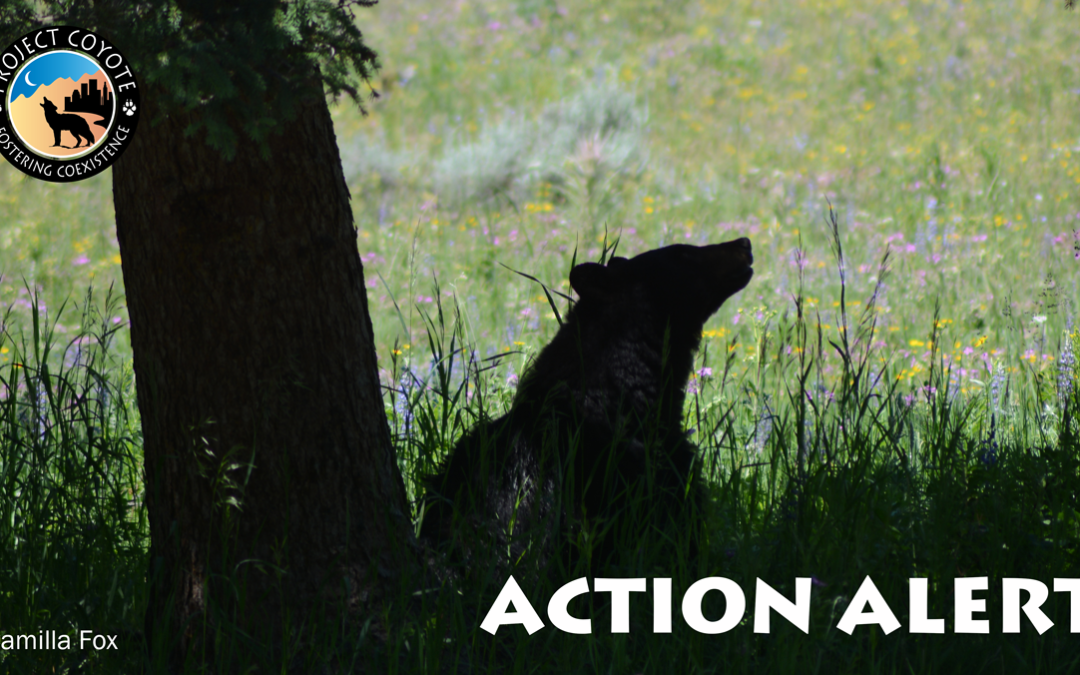North Carolina Residents: Prevent Hunting On Bear Sanctuaries!
Oppose this black bear hunt by Jan. 31
North Carolina’s black bears need your voice. The North Carolina Wildlife Resources Commission (NCWRC) is proposing to open three of the state’s bear sanctuaries to permitted bear hunts, at the request of the U.S. Forest Service, citing “increased human-bear interactions.”
However, no attacks have occurred and studies have shown hunting doesn’t prevent potential conflict. Bears in Panthertown and other areas surrounding the sanctuaries are protected and well-loved in their communities.
In fact, Bill Lea, a former district ranger with the U.S. Forest Service who worked in the area, says killing local bears that have been protected for 50 years won’t solve potential issues with human-bear interactions.
Read the proposed rule change. Then, take action:
1) Submit a written comment to NCWRC by January 31. Follow the instructions below:
- First, fill out the required contact information fields and when done, click “Next.”
- On the next screen, select “Land and Water Access Proposals” and click “Next.”
(Note: this proposed rule change is NOT under “Wildlife Management”) - Then, scroll to the bottom of the page and select, “G13 Bear – Allow permit hunt opportunities on Panthertown – Bonas Defeat, Pisgah, and Standing Indian Bear Sanctuaries in the Mountain Bear Management Unit” and click “Next.”
- Select “Do Not Support.”
– Provide additional comments in the box provided using the talking points below.
– Click “Next.” - This returns you to the screen with all of the proposed rule changes. If you don’t want to comment on other rules, select “I’m Finished” at the bottom of the page and click “Next.”
- Press “Done.” Thank you; your comment is submitted!
If you prefer, you can write a letter instead of using the public comment form and email it to: regulations@ncwildlife.org. Your letter must include your name, phone number, and mailing address. These are sometimes ignored, which is why we ask that if you can, please submit your comments via the public comment link above.
Remember, the public comment period for this proposed hunting season ends on January 31!
2) Attend a virtual public hearing at 7 p.m. ET on January 20 so that voices other than trophy hunters are represented. Be sure to register in advance.
3) Then, write a Letter to the Editor (LTE) to your local newspaper to raise awareness. Use the talking points below.
TALKING POINTS (Remember to personalize your message and be respectful):
- These bears live on designated sanctuaries, and do not know the dangers humans can pose to them.
– It is not sportsmanlike to pursue an animal that does not see humans as a threat. These bears have lived half a century without being hunted, and it violates fair chase principles to pursue them. - Hunting bears does not make people safer, nor does it stop human-bear conflicts.
– Rather than putting time and resources into opening a black bear hunting season, the U.S. Forest Service should expand education on non-lethal preventive measures to reduce human-bear conflicts.
– Because food availability plays a large role in the presence of bears in urban areas, human food sources are the root cause of conflicts.
– Using bear-resistant trash cans, cleaning up BBQ grills, feeding pets indoors, and using electric fencing around chicken coops and beehives can effectively reduce the chance of conflict. - The proposed hunting season could result in orphaned bear cubs, which is ethically indefensible.
– While the proposed season would prohibit the killing of cubs less than 75 pounds and mothers with cubs, there is nothing prohibiting the killing of a mother whose cubs are not within eyesight.
– A hunter would have no way to know if a bear has cubs until it is too late.
– Bears reproduce very slowly and are highly susceptible to overkill.
– There is no mention of a limit to the number of permits that would be handed out.
Allowing hunting on protected bear sanctuaries would violate NCWRC’s responsibility to conserve wildlife and uphold the public trust.
North Carolina needs its bears — and the bears need you to speak up!
Camilla H. Fox
Founder & Executive Director
Michelle Lute, PhD
National Carnivore Conservation Manager



